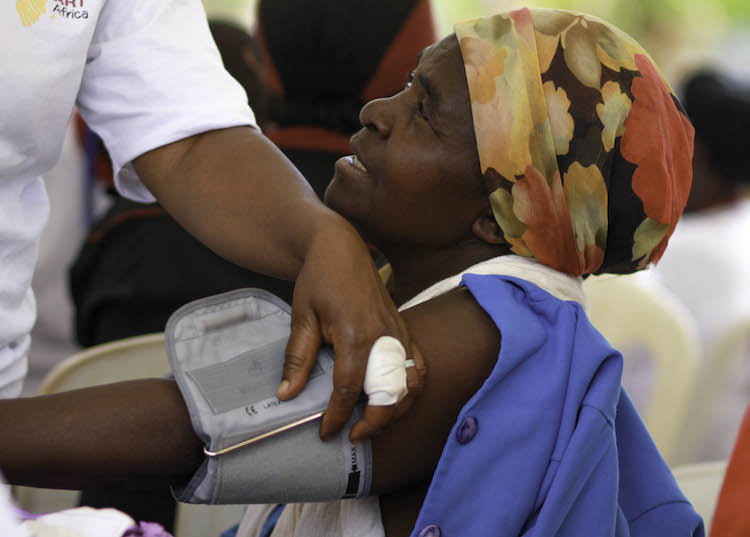Integrating NCDs Into Post-2015 Agenda: A shared value approach to addressing non-communicable diseases in Africa
United Nations member states and members of the global health community agree that one of the major challenges to development is the growing epidemic of non-communicable diseases (NCDs).
These diseases account for two out of three deaths and half of all disability worldwide, with cardiovascular disease (CVD) specifically killing more Africans over age 30 than any other condition. Despite this growing threat, the resources devoted to curbing NCDs are woefully insufficient to the challenge. If left unchecked, NCDs could jeopardize the future health and well-being of millions of Africans, potentially curtailing the continent’s continued economic and social development.
To acknowledge and reflect the changing global health environment, NCDs must be integrated into the Sustainable Development Goal (SDG) framework and global health actors must work together to identify avenues to prevent, control and curb these diseases.
Tackling NCDs in Africa
CVD is difficult to treat, and requires a collaborative, multi-sectoral response. To succeed, we must find new ways to leverage the technical knowledge, communication platforms, supply chain infrastructures and human resource expertise of the private sector, to complement the efforts of governments and non-governmental organizations. Working together, we can identify and implement effective programs that focus on the prevention, treatment and management of these diseases, particularly in low- and middle-income countries that bear the biggest burden.
In Kenya, health officials, AstraZeneca (where the author is executive vice president) and other public and private sector partners have embarked on Healthy Heart Africa, a first-of-its-kind effort to activate existing health facilities across the nation to reduce hypertension. The program takes a “360 degree” approach to addressing hypertension by raising awareness, training health care workers to provide comprehensive and appropriate care, and providing access to affordable, high-quality treatments for cardiovascular disease – a core therapy area of AstraZeneca.
We are currently implementing 18-month demonstration projects working closely with seven outstanding partners – AMPATH, AMREF Kenya, the Christian Health Association of Kenya, Jhpiego, Population Services Kenya, Mission for Essential Drugs and Supplies and Abt Associates. These strategic partnerships ensure the skills and networks of each of the partners are leveraged to inform comprehensive and sustainable programs that integrate care into existing platforms.
The collaboration is the first public-private partnership of its kind designed to address the growing problem of hypertension and cardiovascular disease in sub-Saharan Africa.
The program is in the process of mobilizing more than 250 health facilities to provide hypertension services with plans to expand to new countries over time with the goal of reaching 10 million hypertensive patients across the continent by 2025.

(Healthy Heart Africa is a first-of-its-kind effort that takes a “360 degree” approach to addressing hypertension.)
Bringing Private Sector Solutions to Public Health Challenges
AstraZeneca has committed its skills, knowledge and products to address this major global health need through a sustainable business platform, which will enable us to reach more people and improve more lives. Healthy Heart Africa is led by the company’s commercial arm, which has been closely involved in the program design and on-the-ground implementation, establishing a new model for “shared value” in public-private partnerships. We work side by side with our partners to ensure we are developing the smartest and most effective programs to reach those most at risk.
We’ve made significant progress since the launch in October 2014, including:
- Developed a hypertension treatment protocol to define the appropriate approach to hypertension care both at the primary care level and in more complex settings;
- Created a full suite of training materials for health care providers and community health workers on hypertension prevention, screening, diagnosis and treatment which can now be used in other countries;
- Trained more than 1,000 health care workers – with a goal of doubling this number over the next few months;
- Launched the Blood Pressure Matters awareness and prevention campaign which included conducting focus groups and obtaining provider feedback on what resonates with patients when it comes to accessing preventative care;
- Mobilized more than 250 health facilities to provide hypertension services;
- Screened more than 100,000 Kenyans for hypertension.
At the end of the 18-month demonstration period we will review the impact of our efforts and seek to scale up the most successful components across Kenya in partnership with the Ministry of Health and eventually across the continent. We are learning as we go and believe that the best way to decrease the burden of hypertension is by collaborating with our implementing partners, identifying what works and adapting as needed.
Private Sector Tools for Public Health Challenges
Our program design and implementation is guided by the following tenets and we believe that other private sector peers can consider these principles when developing public health programs:
Partner- across sectors. Coordination and collaboration among and between the private sector, governments and nongov-ernmental organizations help effectively deliver context-specific sustained health care solutions.
Invest in local capacity. By improving human resources and health care infrastructure through activities such as train-ing health care providers, developing and sustaining a supply chain infrastructure, and task shift-ing health care services, we can ensure health care delivery is timely, accessible and sustainable.
A 360 approach. Creating an environment where populations can live a healthy and full life requires more than treat-ment. It requires investments in systems that provide indi-viduals with appropriate health information, tools to maintain a healthy lifestyle and access to high-quality, affordable treatment when needed.
Mark Mallon is executive vice president, international, of AstraZeneca.
- Categories
- Health Care
